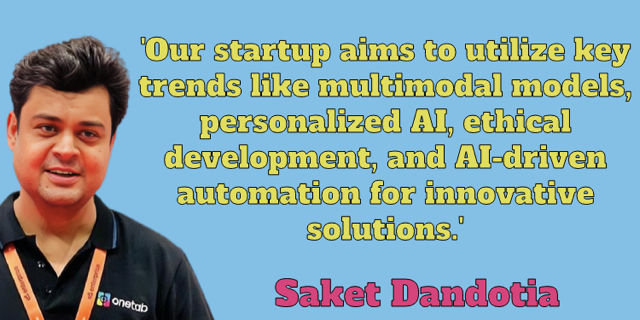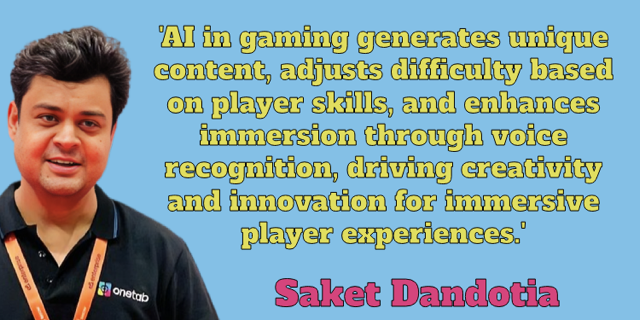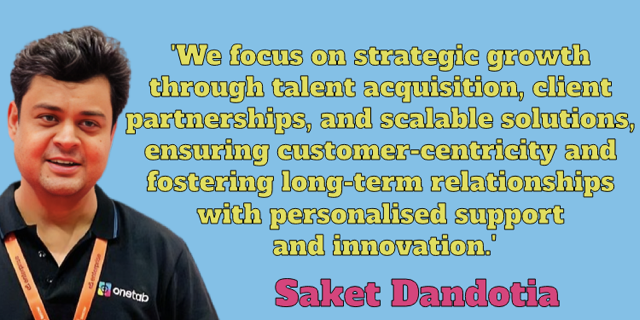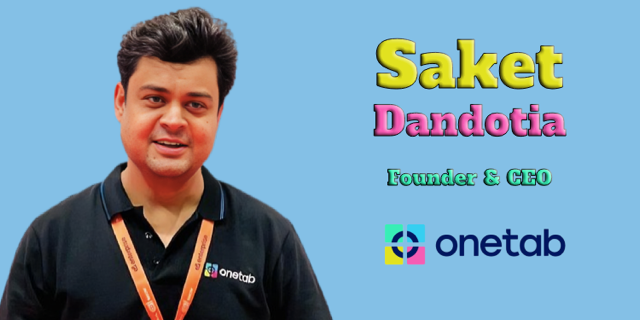Saket Dandotia and Alok Patil departed from Videoverse to establish Onetab, a Generative AI SaaS startup launched in 2023. Onetab offers innovative AI-based SaaS solutions, emphasising seamless communication and collaboration through its proprietary custom LLM model. This feature distinguishes the startup from existing competitors in the market, promising to transform team interactions and workflows.
As part of their expansion plan and strategy for the current year, the AI startup has appointed a team consisting of Judah Guber as VP of Strategy and Partnerships, Harish Chouhan as Senior Team Lead, Pratish Gopinath as VP of Corporate Development, and Ankita Phanse as Head of HR Strategy and Planning. According to the company, this move is a significant step towards realising its long-term growth strategy across both Indian and global markets.
They have recently introduced OneBharat, a series of developer community gatherings held across India for technology and AI enthusiasts. These meetups aim to establish and nurture a community of AI developers and technology aficionados, promoting collaboration, innovation, networking, and knowledge sharing.
Medianews4u.com caught up with Saket Dandotia, founder, CEO Onetab
Could you talk about the market opportunity that prompted the founders to leave Video verse and launch OneTab?
As former founders of Videoverse, our team has had the privilege of witnessing firsthand transformative power of technology in revolutionising content creation, and consumption. However, during our journey, we identified a gap which looked like a great market opportunity, in the space of Gen AI, that we simply couldn’t ignore, and this prompted us to launch OneTab.
At Videoverse, our primary focus was on enhancing video content, to make it more engaging and interactive. However, in our interactions with users and industry stakeholders, we repeatedly encountered a significant pain point: the overwhelming clutter of information and tabs that users had to manage daily. This fragmentation was not merely a minor inconvenience; it was a major productivity bottleneck affecting professionals, students, and everyday users alike.
Today’s digital landscape demands seamless, efficient management of information. Users juggle multiple applications, websites, and documents, leading to a fragmented workflow and a scattered digital environment. This fragmentation results in lost productivity, increased stress, and a less cohesive user experience.
Recognising this challenge, we saw a compelling opportunity to make a meaningful impact. Onetab was created to provide a streamlined, unified platform that consolidates all your digital tabs into a single, organized space. Our goal is to empower users to focus on what truly matters by reducing digital clutter and enhancing productivity.
Onetab aims to transform how users interact with their digital environments, much like how Videoverse redefined video engagement. We believe that by simplifying and organizing the digital workspace, we can unlock new levels of efficiency and effectiveness for our users.
The market opportunity here is immense. With the rise of remote work, online learning, and digital collaboration, the need for an intuitive solution to manage digital overload is more pressing than ever. Onetab is positioned to address this need, providing a solution that is both innovative and essential in today’s fast-paced digital world. We are excited about the journey ahead and are committed to delivering a product that enhances how people manage their digital lives.
How does the company’s LLM Model impact the way in which teams work together?
Our proprietary LLM (Large Language Model) at Onetab is designed to revolutionise team collaboration and productivity through our unique feature, Onetab Insight. This advanced tool leverages cutting-edge data science and analytics to enable users to interact with their databases using natural language, profoundly transforming how teams work together. Simplifying Data Interaction
Simplifying Data Interaction
One of the most significant impacts of our LLM model is the simplification of data interaction. Traditionally, accessing and analyzing data required technical expertise and the use of complex query languages. With Onetab Insight, team members can ask questions in simple English and receive detailed, accurate responses. This democratises data access, allowing every team member, regardless of technical proficiency, to engage with and leverage data effectively.
Enhancing Decision-Making
By providing visually appealing and easily digestible reports, our LLM model ensures that insights are not only accessible but also immediately understandable. This visual clarity facilitates quicker and more informed decision-making. Teams can promptly identify trends, spot anomalies, and derive actionable insights without the bottleneck of data interpretation delays. Consequently, this leads to more agile and responsive business strategies.
Fostering Collaboration
Onetab Insight helps teams work better together by making data easily accessible to everyone, not just a few people. Team members across different departments can view and analyze the same data, prompting alignment and shared goals. This common understanding of enables teams to collaborate more effectively, come up with better ideas, and innovate more easily.
Streamlining Workflows
Our LLM model streamlines workflows by integrating data analytics directly into the daily operations of teams. Instead of switching between multiple tools and platforms to gather and analyze data, users can interact with their databases within OneTab. This integration reduces friction and saves valuable time, allowing teams to focus on high-impact tasks rather than getting slowed down by technicalities.

Driving Revenue Growth
The capabilities of our LLM model are central to our ambiguous go-to-market strategy, aimed at generating $200 million in revenue over the next three years. By significantly enhancing team collaboration, decision-making, and productivity, we are confident in our ability to capture substantial market share and deliver exceptional value to our users and partners.
OneTab’s LLM model profoundly impacts team dynamics by democratising data access, enhancing decision-making, fostering collaboration, streamlining workflows, and supporting our channel partners. These benefits collectively drive our ambitious growth objectives, positioning Onetab as a leader in the digital productivity space.
Gen AI is evolving rapidly. What are the key trends being seen in its development and use cases?
As someone deeply experienced in AI, I am thrilled by the rapid evolution of generative AI. Some key trends we are seeing include the development of multimodal models that can interpret text, images, audio, and user interactions. Personalized AI is gaining prominence, offering tailored experiences across various sectors. Ethical AI development emphasising fairness and transparency too is becoming increasingly important. Additionally, AI-driven automation is revolutionising industries by boosting efficiency and innovation. Our startup is poised to leverage these trends to create advanced solutions, transforming how businesses and individuals engage with technology.
Will it dramatically change the content creation industry through things like more automation?
Absolutely, generative AI is set to significantly transform the content creation industry. Automation will play a pivotal role, enabling faster and more efficient content production. advanced AI models can generate high-quality text, images, and videos with minimal human intervention reducing costs and allowing focus on more strategic and creative aspects of their work. Additionally, AI can personalize content at scale, tailoring it to specific audiences, which enhances engagement and effectiveness.
Bill Gates feels that the risks associated with AI are real but manageable. Do you agree?
I agree with Bill Gates that the risks associated with AI are real but manageable. AI has the potential to bring about tremendous benefits, revolutionising industries and improving lives. However, it’s essential to acknowledge and address the potential risks, such as job displacement, bias in algorithms, and ethical concerns.
Through responsible development, robust regulations, and ongoing dialogue with stakeholders, we can mitigate these risks and ensure that AI technologies are deployed ethically and safely. As a startup in the AI space, our commitment to responsible innovation guides our approach, as we strive to harness the transformative power of AI while prioritising the well-being and security of society.

Could you talk about the game plan of Onetab to rapidly scale through things like employee hires, client roster growth?
We have a strategic approach to growing our company and look forward to rapid scaling. We try to keep a balance of employee and talent acquisition, talent development and overall team expansion. We will leverage our network and industry connections to attract top talent across various domains, including software development, data science, and marketing.
When it comes to client growth, we focus on cultivating strategic partnerships with key players in our target industries to expand our reach and access new markets along with having a Customer-Centric Approach. We are also developing scalable solutions that address the evolving needs of our clients, enabling us to grow alongside them and adapt to changing market dynamics.
We also proactively engage with existing and potential clients to understand their pain points, gather feedback, and offer personalised solutions that drive value and foster long-term relationships. We have a dedicated customer delight department to ensure exceptional customer experiences. From proactive engagement to swift issue resolution, they prioritise customer satisfaction, building lasting relationships through personalised support and innovative solutions.
How will Onetab help companies drive hyper-personalisation at scale?
We have an integrated solution for software development and project management directly within our chat platform. By consolidating all necessary tools into a single interface, Onetab eliminates the need for users to switch between multiple applications, boosting productivity by up to 30%.
Features such as task assignments, progress tracking, and seamlessly sharing files allow teams to focus on their work. Our sleek interface minimizes clutter and improves focus, while its AI technology ensures an efficient and productive work environment.
Features like OneChat, OneAPI, OneKanban, OneCICD, and OneAnalytics empower users across various roles to collaborate effectively and streamline workflows providing hyper-personalized project management experiences.
Is helping save companies costs and be more efficient a key focus area for OneTab?
Yes, at OneTab, we do look at helping companies save costs and become more efficient. Our platform is designed to streamline workflows, automate repetitive tasks, and optimiSe resource allocation, all of which contribute to cost savings and increased efficiency for our clients. By leveraging AI-driven automation and data analytics, We enable companies to:
- Reduce Operational Costs: By automating manual processes and optimizing resource utilisation, Onetab helps companies minimize overhead costs and improve operational efficiency.
- Enhance Productivity: Onetab streamlines workflows and eliminates time-consuming tasks, allowing employees to focus on higher-value activities, thereby boosting overall productivity.
- Improve Decision-Making: With access to real-time insights and predictive analytics, Onetab empowers companies to make data-driven decisions that optimize performance and resource allocation.
- Drive Innovation: By freeing up time and resources, Onetab enables companies to allocate more resources towards innovation and strategic initiatives, fostering long-term growth and competitiveness.
Will AI clones be the next step five years down the road where they can do one’s work like shopping, cooking? Or will that come in later on?
As I see it, AI clones for tasks like shopping and cooking are unlikely to become mainstream within the next five years, but they are certainly a stepping stone in that direction. Some Challenges for AI clones in the next five years include:
- Limited Capability: While AI can excel at specific tasks, replicating the full range of human abilities for complex activities like shopping (considering preferences, quality, substitutions) or cooking (adapting to ingredients, taste) is difficult.
- AI Assistants: We already have AI assistants like Google Assistant or Alexa who can handle basic shopping lists or recipe recommendations.
The Future (Beyond 5 years):
- More Advanced AI: As AI becomes more sophisticated, it might be able to handle these tasks with greater nuance.
- Digital Clones: Companies are already developing AI “clones” that can mimic a person’s voice and way of speaking for tasks like attending meetings. This technology could evolve for personalized shopping or cooking instructions.
Overall, AI advancements are likely to make our lives easier in these areas, but it may take longer than five years for truly autonomous AI clones to become a reality.
On the flipside will AI merely take away jobs like coding, transcription or will it create job opportunities?
AI has the potential to transform jobs like coding and transcription by reshaping the nature of these roles rather than eliminating them. AI excels at automating repetitive tasks, such as basic coding or data entry in transcription, which may reduce the need for roles solely focused on these activities.
However, AI also presents exciting opportunities. New roles will emerge, including AI Specialists who train and troubleshoot AI models, Data Scientists crucial for preparing data for AI systems, and experts in Human-AI Collaboration, who design workflows to optimize interactions between AI and human workers.
Moreover, existing roles will evolve and require skills like problem-solving, creativity, and human-centered design. This shift will create a dynamic job market, where adaptation and upskilling are essential for success in the evolving landscape.
Do you have a view on how AI is transforming the gaming industry by offering things like more immersive experiences?
I am incredibly enthusiastic about the transformative power of AI in the gaming industry. It’s not just about better graphics or faster processing speeds anymore. AI is fundamentally reshaping how we experience games, creating a level of immersion that was unimaginable just a few years ago. AI is revolutionizing the gaming industry by offering unprecedented levels of engagement for players. With advanced AI algorithms, games can now adapt dynamically to player behaviour, creating personalised experiences that evolve in real time.
One of the most exciting aspects of AI in gaming is its ability to generate procedural content, such as levels, maps, and characters. This ensures that every playthrough is unique, offering endless possibilities and challenges for players to explore.
Additionally, AI enables adaptive difficulty systems that adjust the game’s challenge level based on the player’s skills and performances ensuring that players are always appropriately challenged, leading to a more satisfying gaming experience.
Voice recognition technology powered by AI also allows for more natural interactions between players and in-game characters, enhancing immersion and enabling new forms of gameplay.
Overall, AI is unlocking new dimensions of creativity and innovation in the gaming industry, offering players more immersive experiences than ever before. As AI technology continues to evolve, I’m excited to see how it will further transform the gaming landscape in the years to come.

















